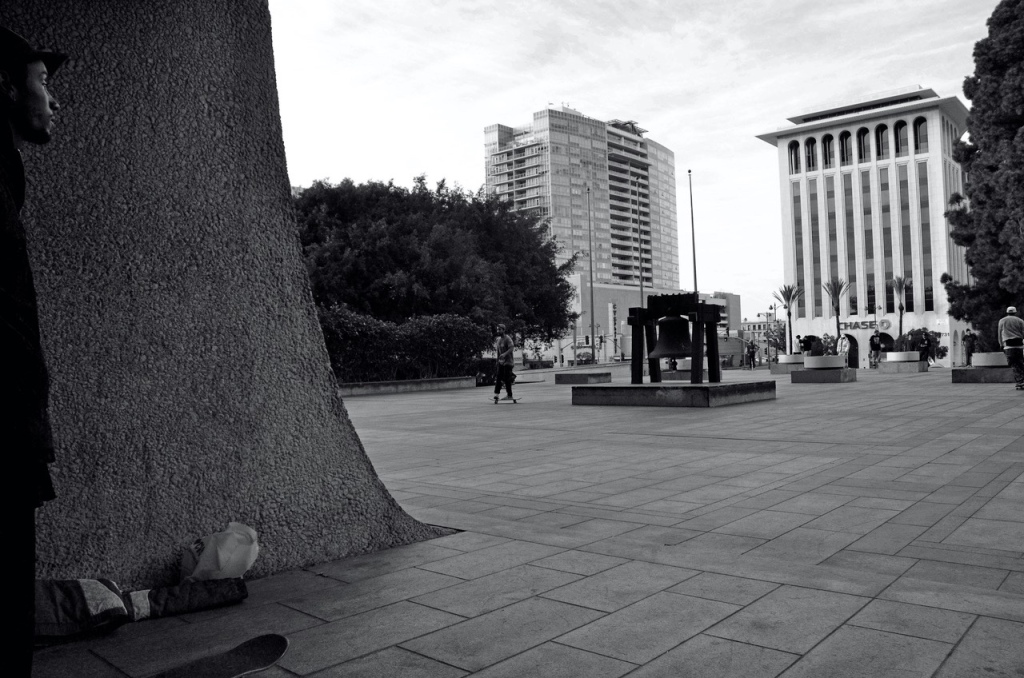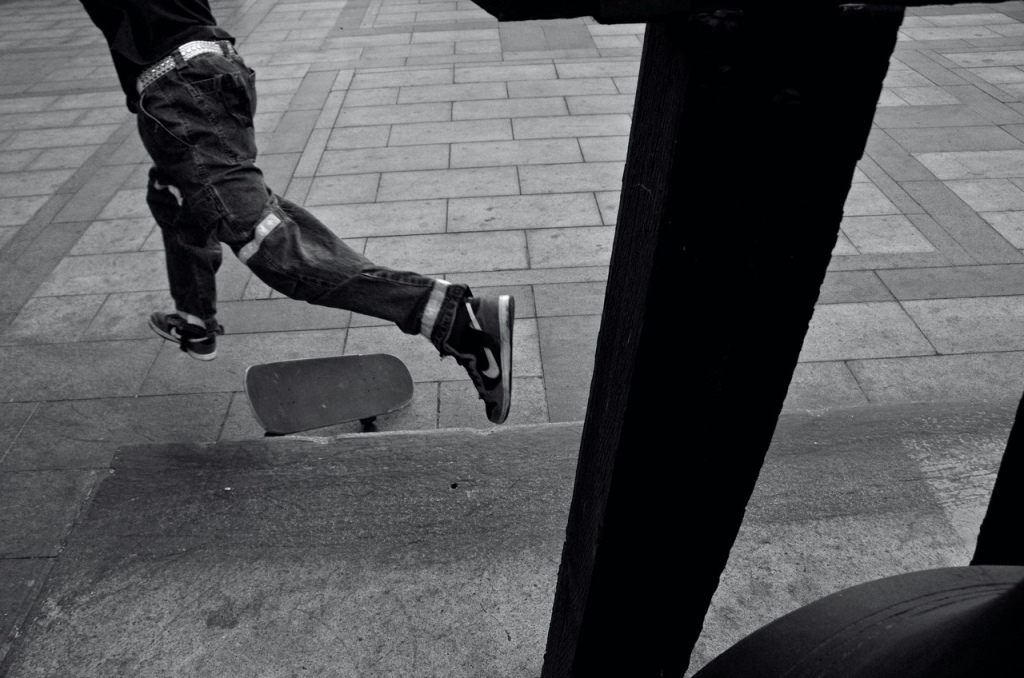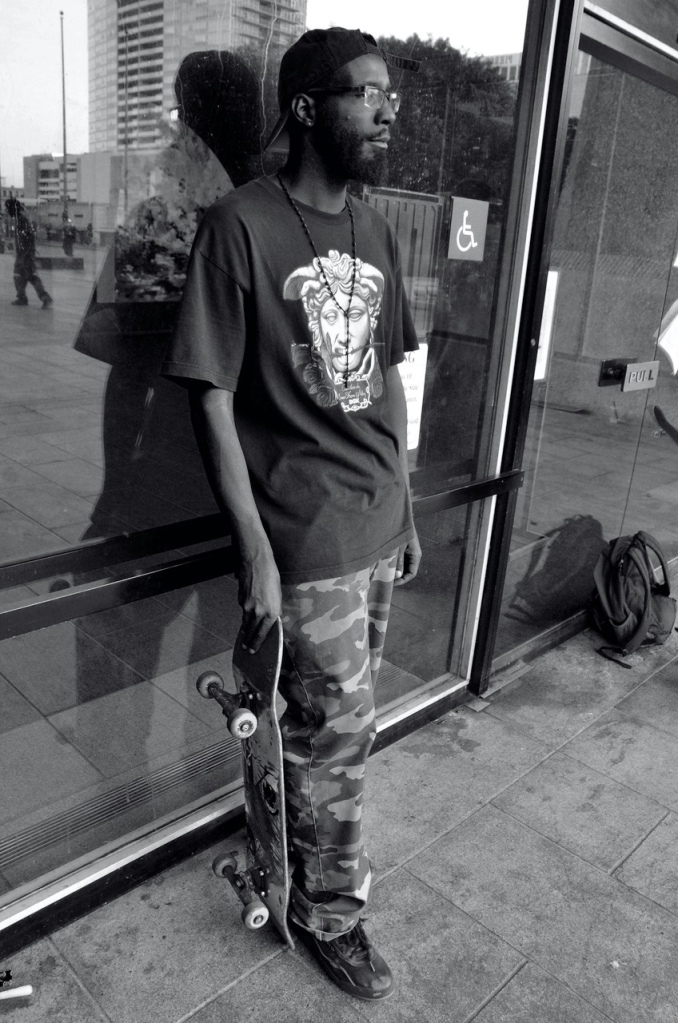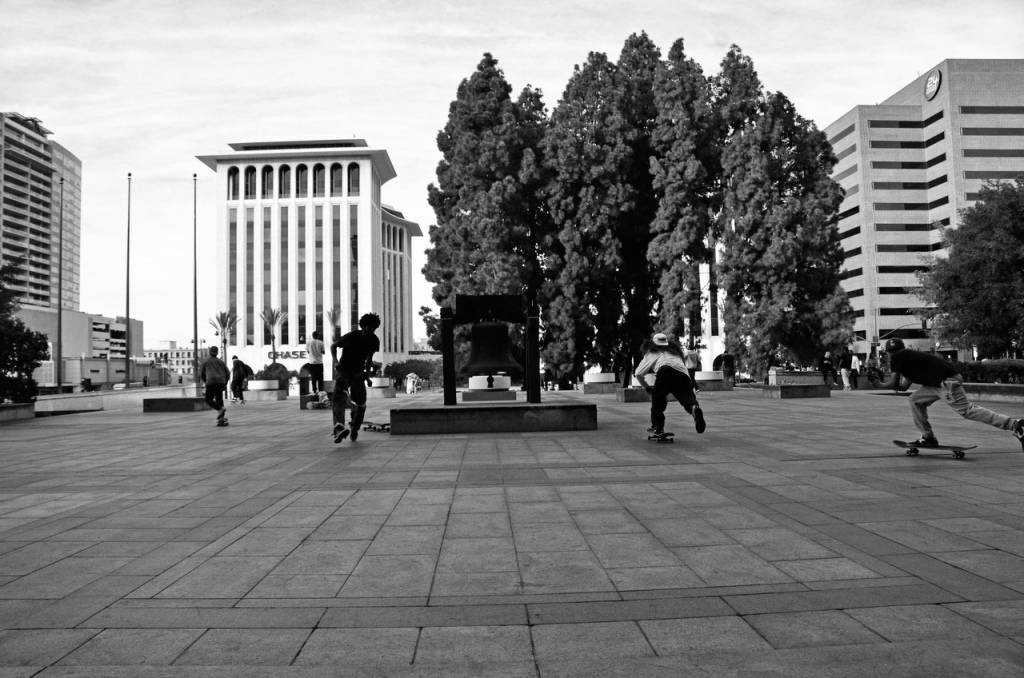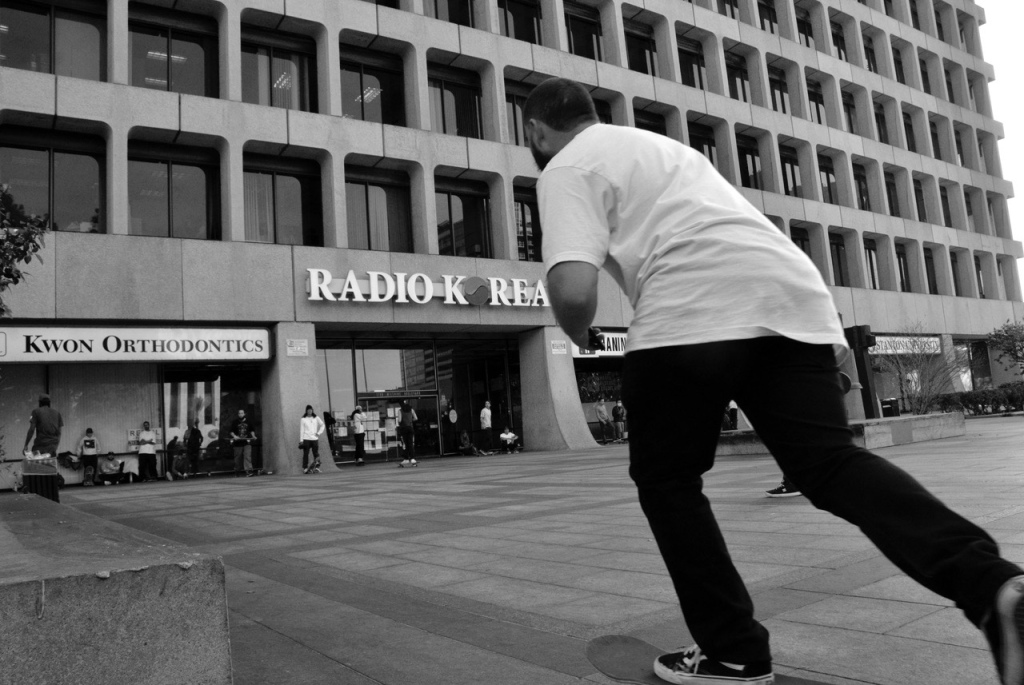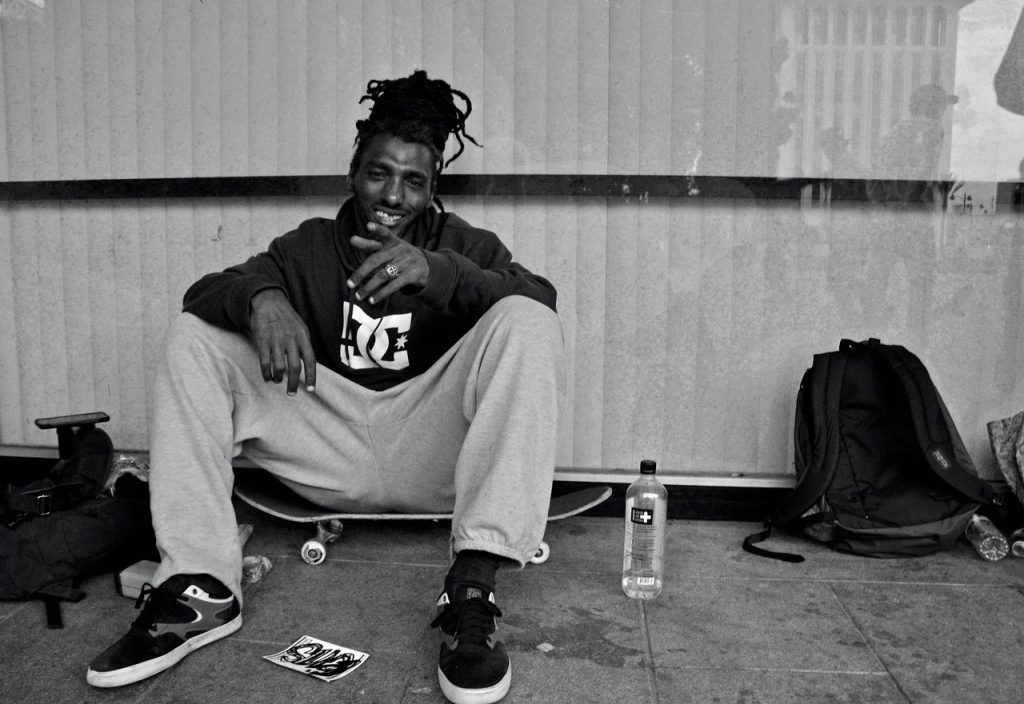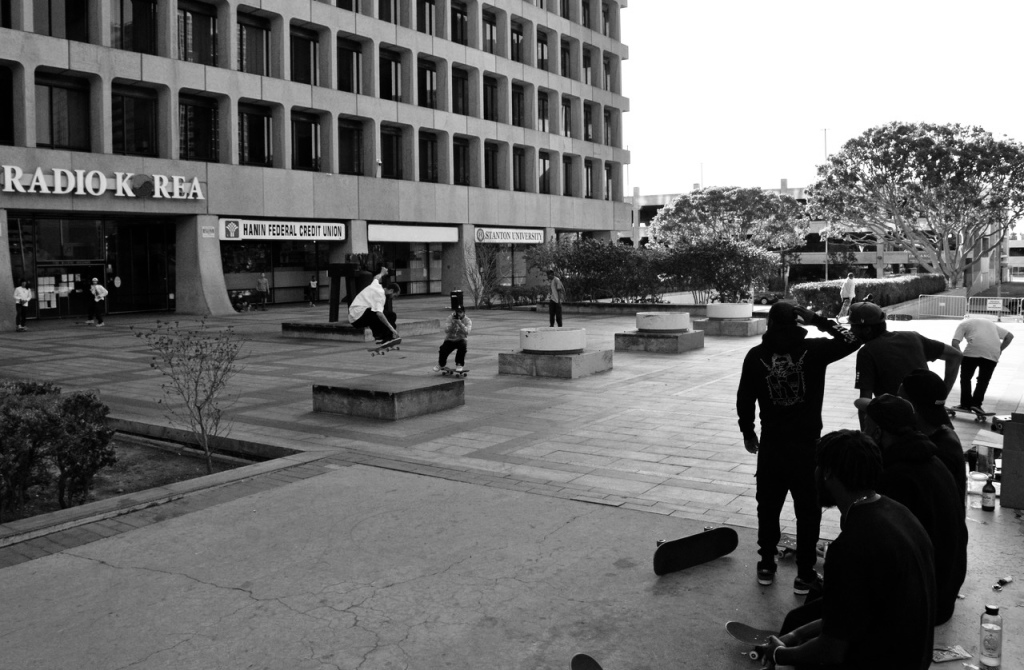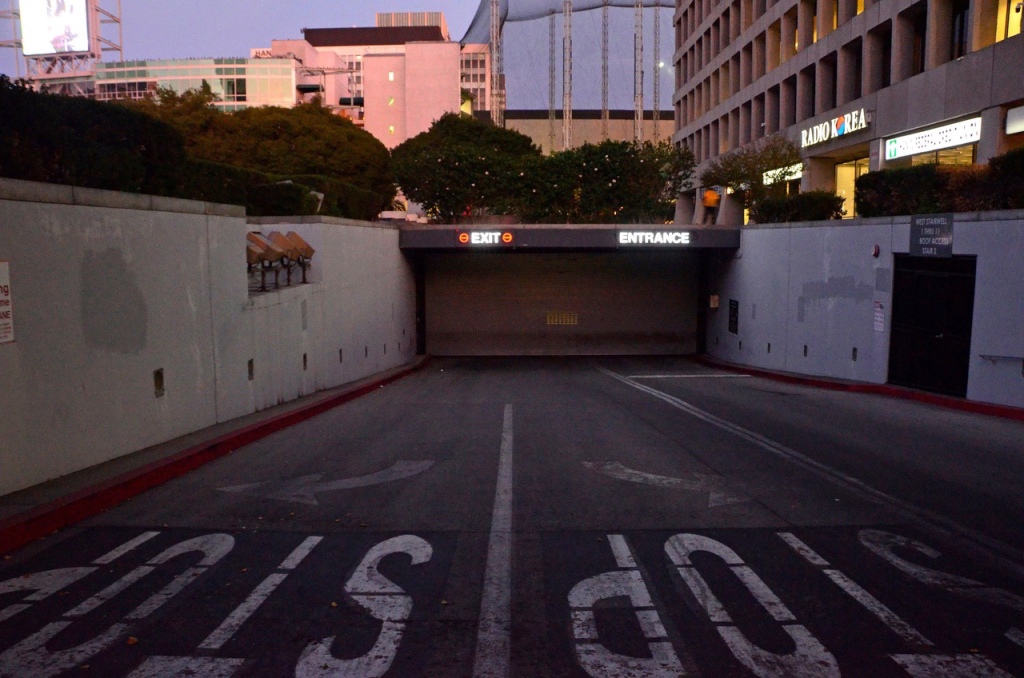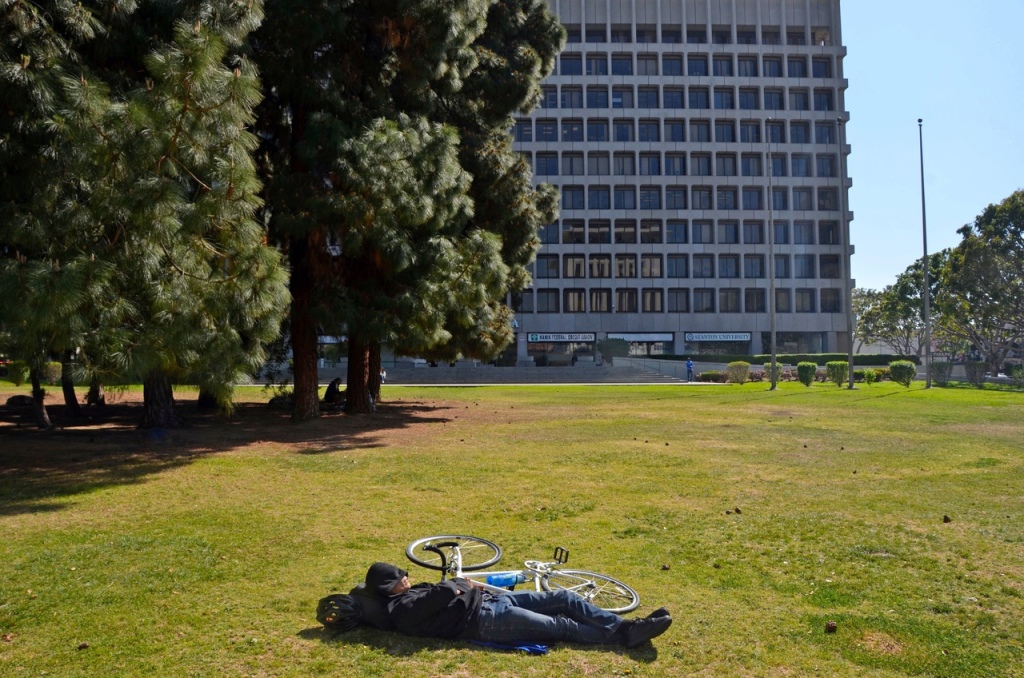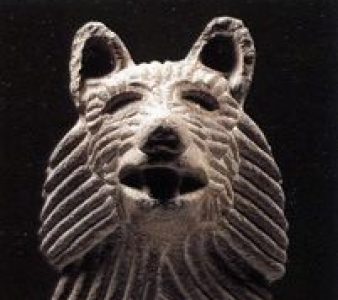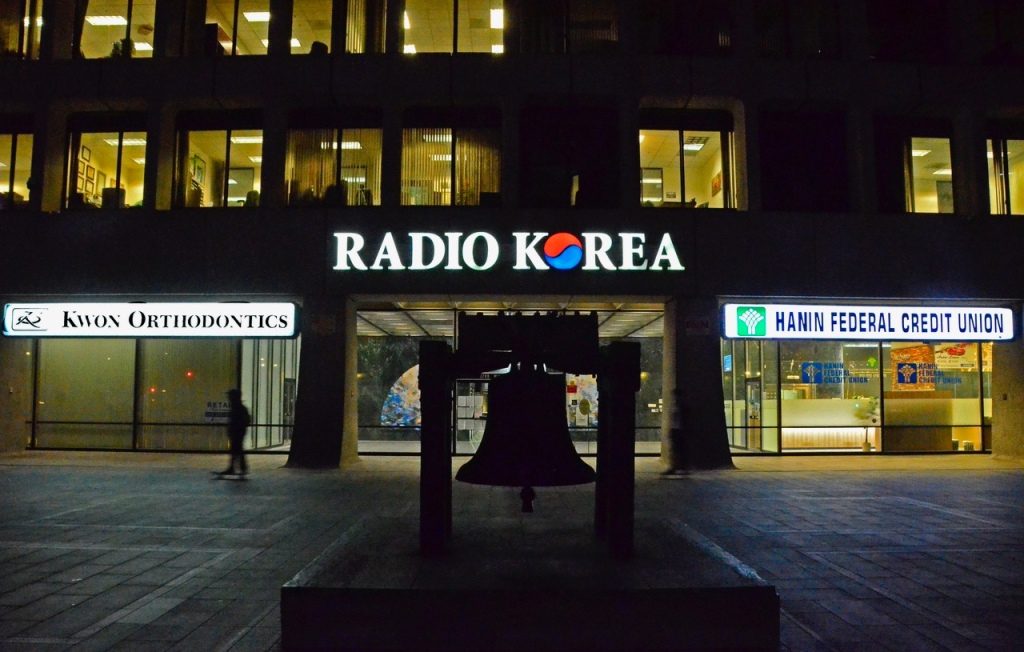
By Jose Tobar|Writer
Los Angeles, Koreatown – Every Sunday morning “church” is in service outside the 11-storied office tower known as Wilshire Park Place in Liberty Park, an iconic Los Angeles skate spot dubbed under pandemic inspired reverberations by the skateboarding community: JKwon, L.A.’s LOVE Park.
Skateboarders of all ages, shapes and sizes swarm to skater “Mass” there on the weekend. They veer like locusts “ollieing” into, off or over the plaza’s various granite stairs and ledges – practicing “tricks”, “giving offerings”, they say. The kind that can get you cracked ankles and wrists.
There’s no Robert Indiana “LOVE” sculpture present like the one installed in 1976 at the original Love Park in Philadelphia. In its stead, a replica of the Liberty Bell sits anchored in the center of the plaza just a few feet away from the large red and blue Radio Korea signage pinned above the building’s entrance.
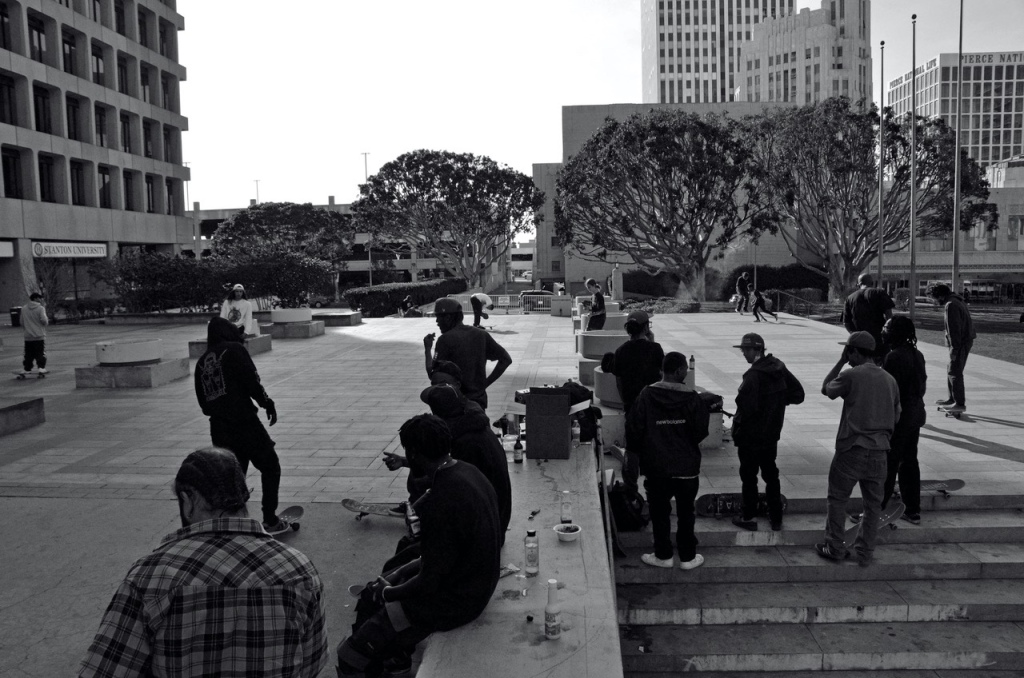
The unspoken rule between management and skateboarders sofar is that on Sundays the plaza is up for grabs. And that’s when they show up for what they call, “Church on Sundays.”
No overzealous cops or security guards are present. No tickethanding or chase giving, blocks past the property line- thanks due in part to the COVID-19 pandemic.
“There’s so much talent here, It’s crazy,” musician and skateboarder, Javan Lassane, 24, said. “It’s just how Love Park was back in the 90s. It might be smaller but I’m stamping it bro.”
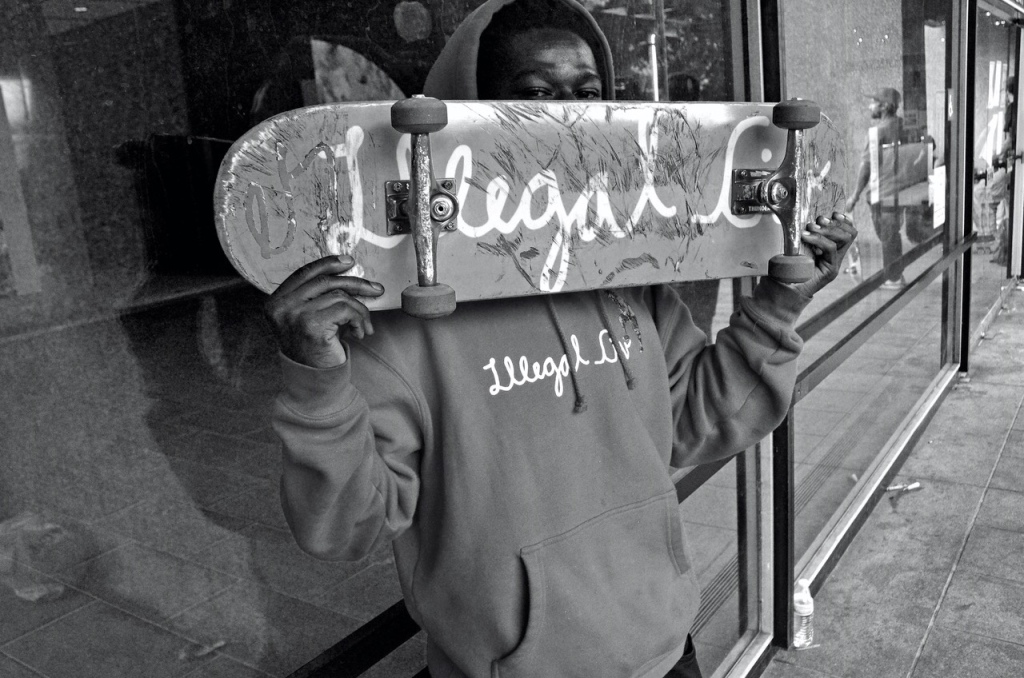
Lassane, who moved to L.A. from Philadelphia in July saw his music career suffer after musical venues began to shut down and opportunities to perform publicly ceased as a result of the pandemic. Skateboarding was the one thing he could always go back to during tough times.
“I grew up skating at Love Park until they tore it down,” Lassane said. “As I progressed with my music I put it aside for a while. But coming back here was like a second life for me. And coincidentally, a second life for this plaza.”
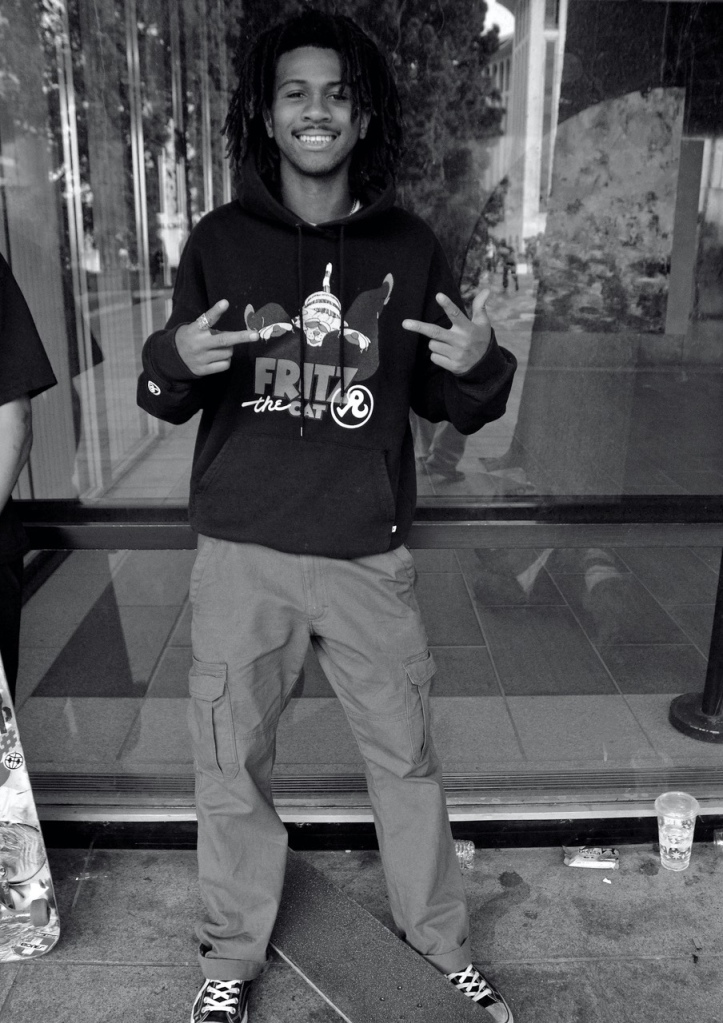
As the pandemic continued to surge throughout 2020, parks and public recreational areas were closed in an effort to stem the spread of the virus. Even though most city parks have reopened it wasn’t until February 23 that skateparks were excepted from closures.
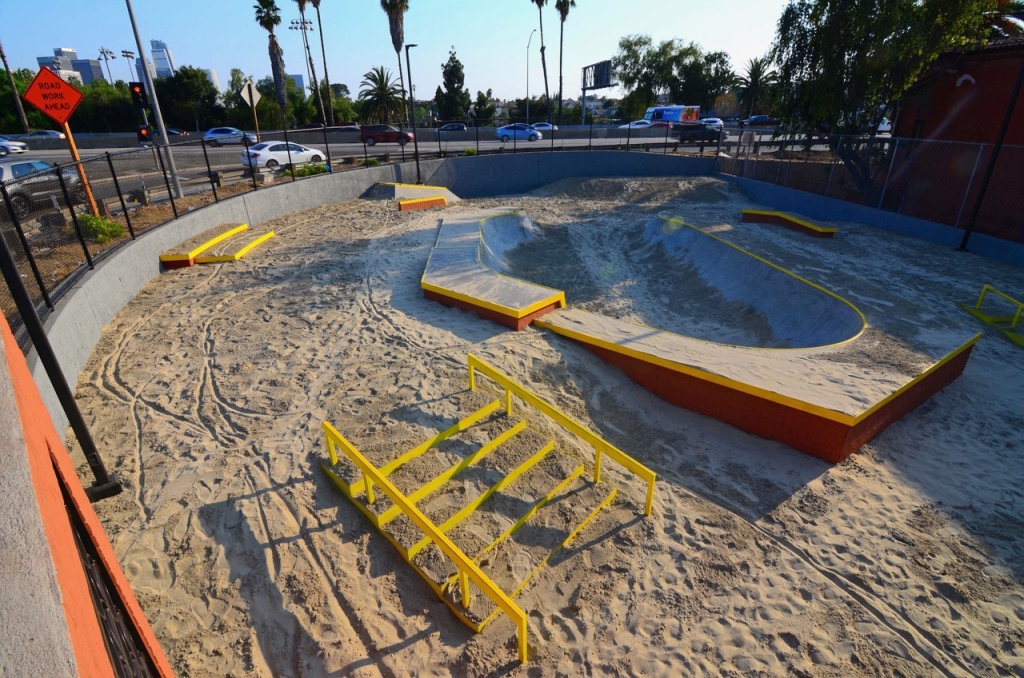
“We were like, ‘F-ck!” former Lucky and Val Surf Skate shop rider, Steve Kindle, said about skateboarding before and during the pandemic.
“We skated then. We got tickets. We got kicked out then and that didn’t stop us,” Kindle said. “So why would they think putting a padlock on a skate park would stop us now?”
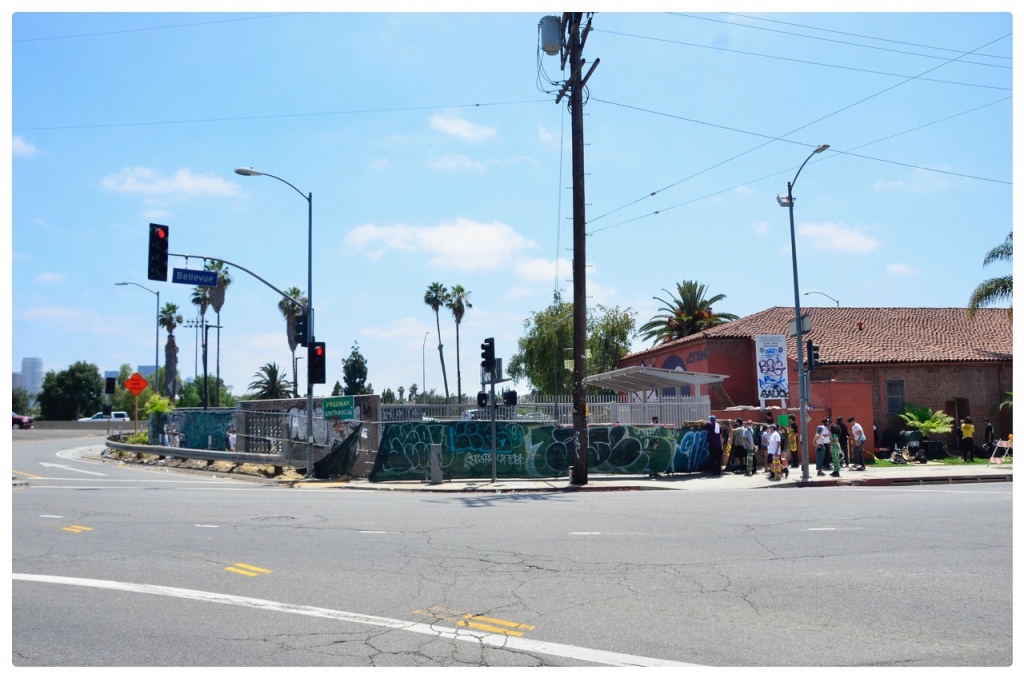
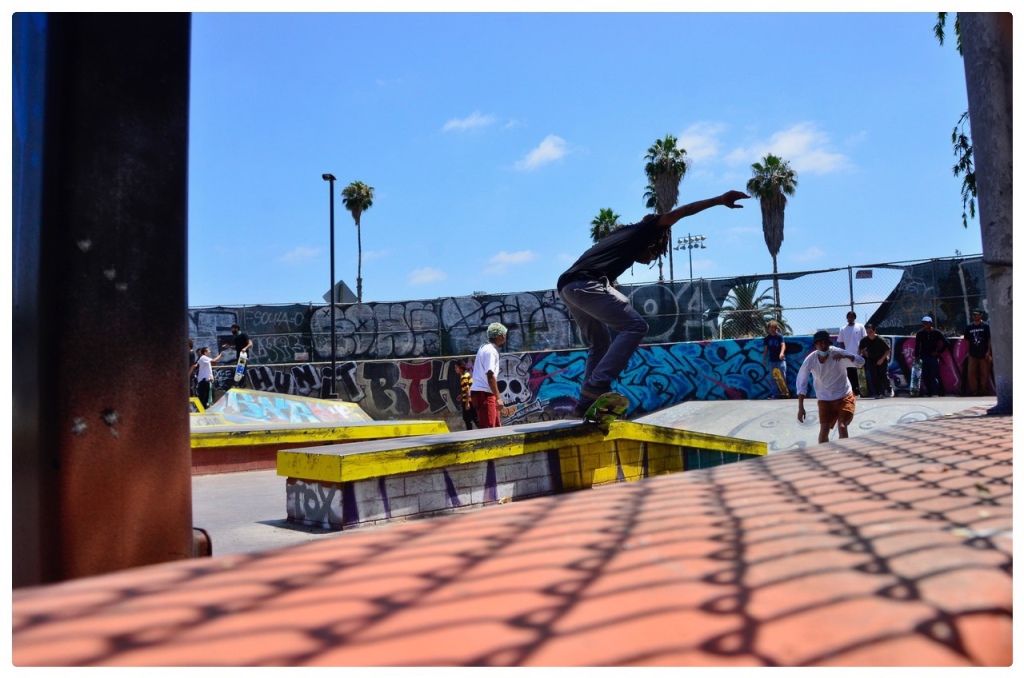
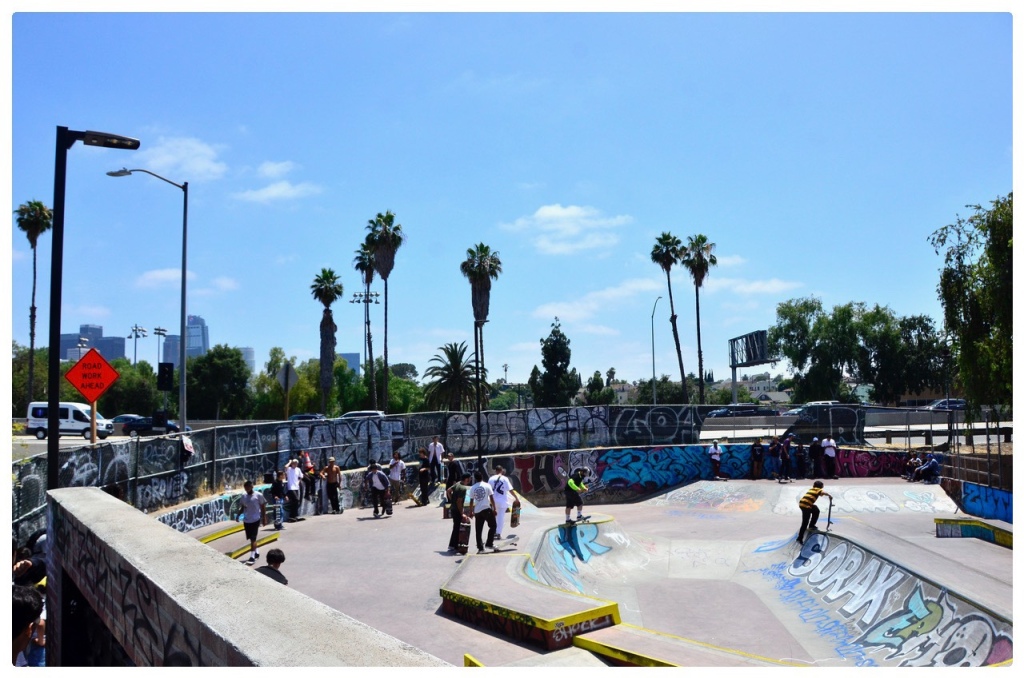
According to Don Cooly, manager for the professional skateboarding company, DGK (Dirty Ghetto Kids), a company headed by legendary street skater and native Philadelphian, Stevie Williams, months had passed with “nowhere to go” because of the shutdown.
“Everything was locked down, so we eventually said, ‘F-ck it,’” Cooly said. “We’re just going to start showing up every Sunday and call it Church. And with Stevie, Razoul, the Phily dawgs and the homies, it just brought back that Love Park feel. That’s why people here love it.”
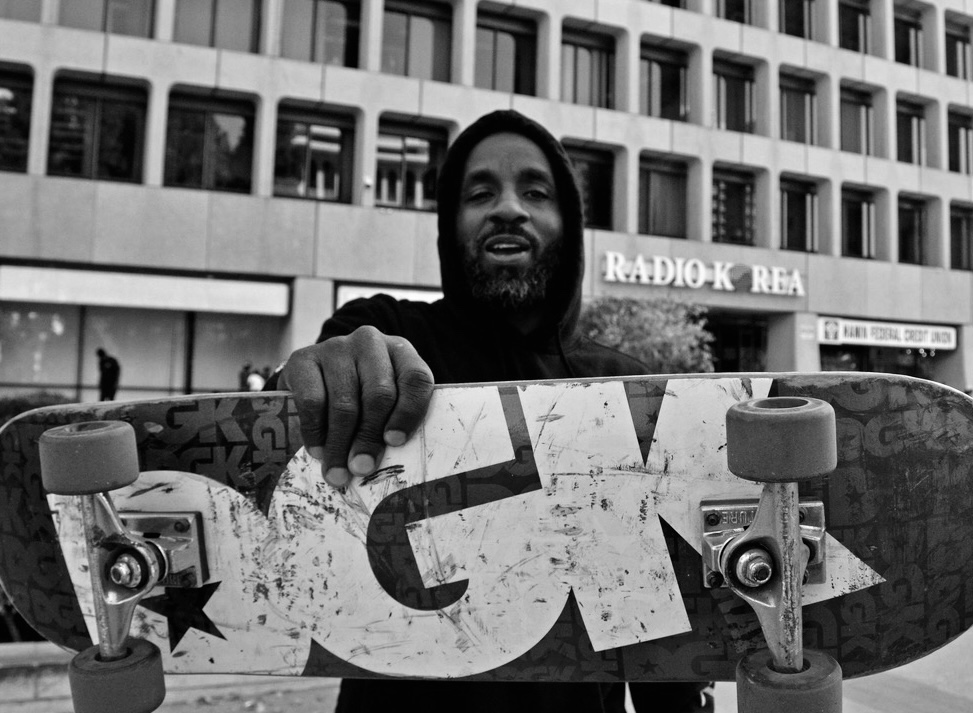
Love Park, or John F. Kennedy Plaza, was an urban park built in 1965 in Center City, Philadelphia, Pennsylvania. Its design provided an ideal combination of street obstacles made up of various size granite steps, ledges and rails that included the famous LOVE gap, a wide set of four steps that led into the fountain area.
From the early 90s and into the late 2000s, it became a fixture in countless skateboarding videos. It’s been featured in Tony Hawk’s Pro Skater series. And it was the site for the 2001-2002 ESPN X-Games.
But despite the rich cultural history skateboarding imbued the park with. Despite the public support and its designers’ original intent to make Love Park a public space for the public, city officials thought it was better suited for only some of the public.
Philadelphia police were notorious for ticketing or arresting skateboarders who frequented it. Throughout its formative and golden years as a skate spot the city outlawed skateboarding several times there.
In 2002, after the ESPN X-Games ended, skateboarding was banned again. Never mind the $80 million revenue the X-Games generated for the city. Even the park’s planner and designer, 92-year-old Edmund Bacon (actor Kevin Bacon’s father) and its architect Vincent Kling, protested.
In a publicly held demonstration caught on video, Bacon defies the city’s anti-skateboarding law by skateboarding the park himself-with a little help- hoping to get arrested.
“And now I, Edmund Dunn Bacon, in total defiance of Mayor Street and the council of the city of Philadelphia, hereby, exercise my right as a citizen of the United States,” Bacon said. “And I deliberately SKATE in my beloved LOVE Park.”
He skated a few feet and declared:
“Oh God, thank you, thank you, thank you. My whole damn life was worth it just for this moment.”
In 2004, one of the biggest skateboarding shoe companies, DC Shoes, offered to gift the city $1million for up to 10 years for the park’s upkeep in exchange for a “balanced” approach to skateboarding. The city turned it down.
As plans to overhaul Love Park got underway the city lifted the “no skateboarding” ban to skaters for one last rendezvous from Wednesday, Feb.10, to Sunday, Feb. 14, Valentine’s Day, 2016.
The renovation was the city’s final effort to end the cat and mouse game that had gone on for over a decade and a half between skateboarders and the police. In the end, the park’s ledges and stairs and all the things that made Love Park a mecca for the skateboarding community world-wide were gone.
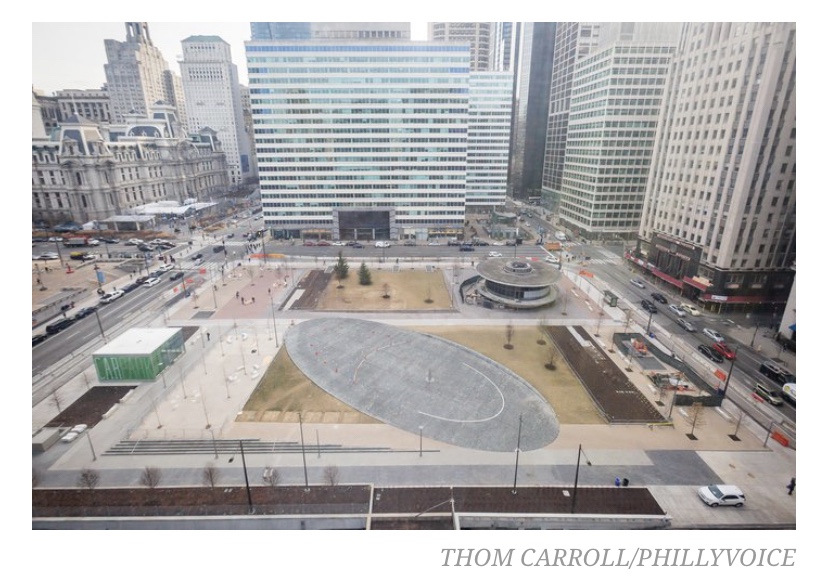
Little was left in its wake after the park re-opened in 2018 other than what one resident described in an interview with the Philly Voice, as an enormous sidewalk that gave her “a case of the Mondays” every time she’d walk through it.
JKwon: LA’s Love Park, (Wilshire Park Place/Liberty Park), nearly suffered a similar fate. Like Love Park, Skateboarders have been congregating at Jkwon since the late 80s. Over the years, they’ve been similarly chased, ticketed, harassed, arrested, banned and outlawed.
The same year that Love Park was set to undergo its makeover in 2016, Koreatown’s biggest property owner, Jamison Services, planned to demolish the site on which both Liberty Park and Beneficial Plaza (Jkwon) rests in order to make room for a 500-unit mixed-use tower.
But a group of local Koreatown residents that fought to protect the space under a campaign they named “Save Liberty Park” succeeded in defeating those plans when the Los Angeles City Council declare the site a Historic-Cultural Monument in 2018.
In the group’s website, savelibertypark.org, the park and plaza are described as a place that hosts a number of public events like Earthday, National Night Out, Save Dok-do Island and an outside viewing of the World Cup.
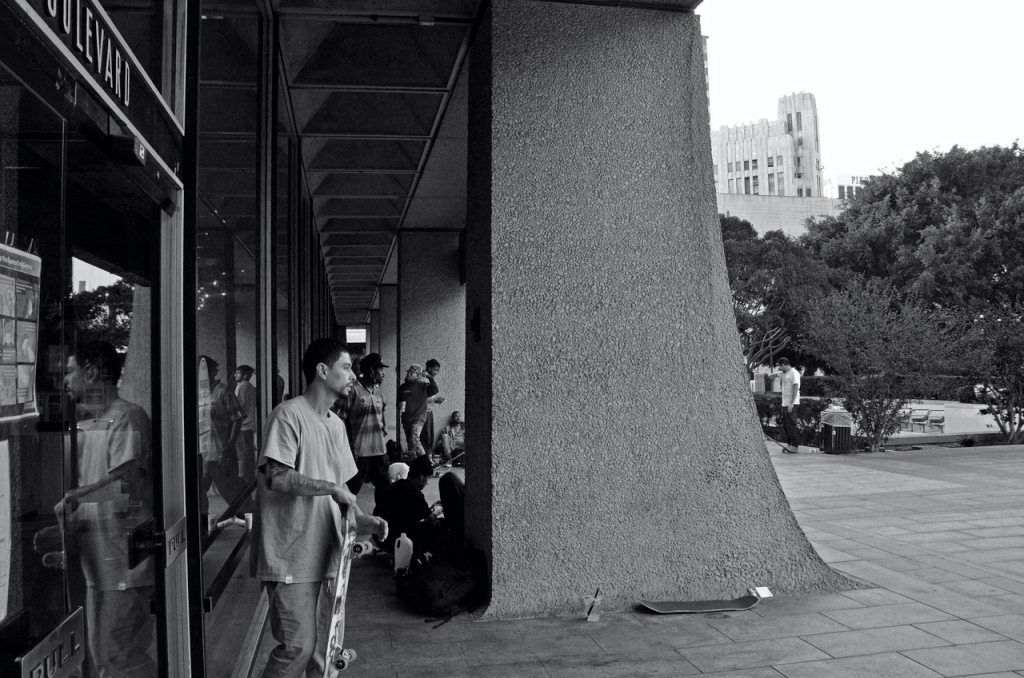
“The park is also a skateboarder’s paradise. The area outside the building is one of L.A.’s most iconic spots for skateboarders,” the site reads before it goes on to mention the lack of parks and green spaces in Koreatown, describing the area “as one of the most “park poor” neighborhoods in the county.”
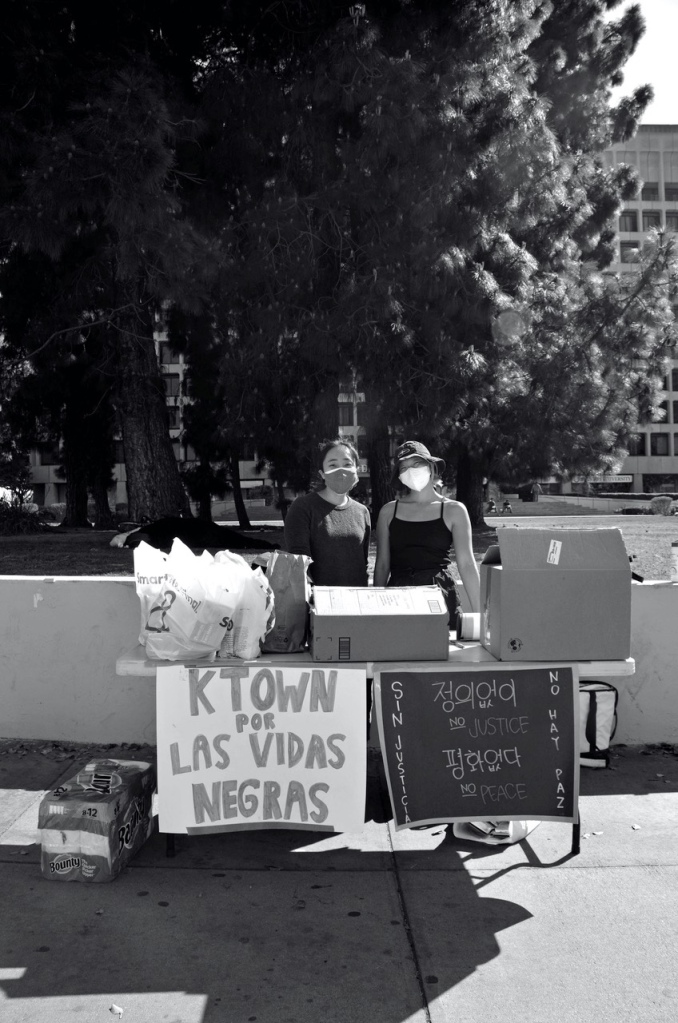
It was the Beneficial Insurance Group company that built Beneficial Plaza and Liberty Park in 1967. Its founder Edward D. Mitchell thought it important to dedicate the 315-foot setback and the hardscaped plaza as “an asset to the community,” according to the laconservancey.org website.
“I’ve never seen it like this,” Fabian Alomar, pro-skateboarder and member of the infamous L.A. skate team, Menace, said during a visit to one of JKwon’s “Church on Sundays” sessions last December. With him was his good friend, Danny “Machete” Trejo.
In no time an admiring crowd surrounded the two, snapping pictures and videos that would later resurface on skateboarder’s Instagram accounts. Even a young 14-year-old skater, Stacey Lugo who had just arrived from Whittier to skate JKwon for the first time, was invited by both Machete and Alomar to pose together for a photo op.
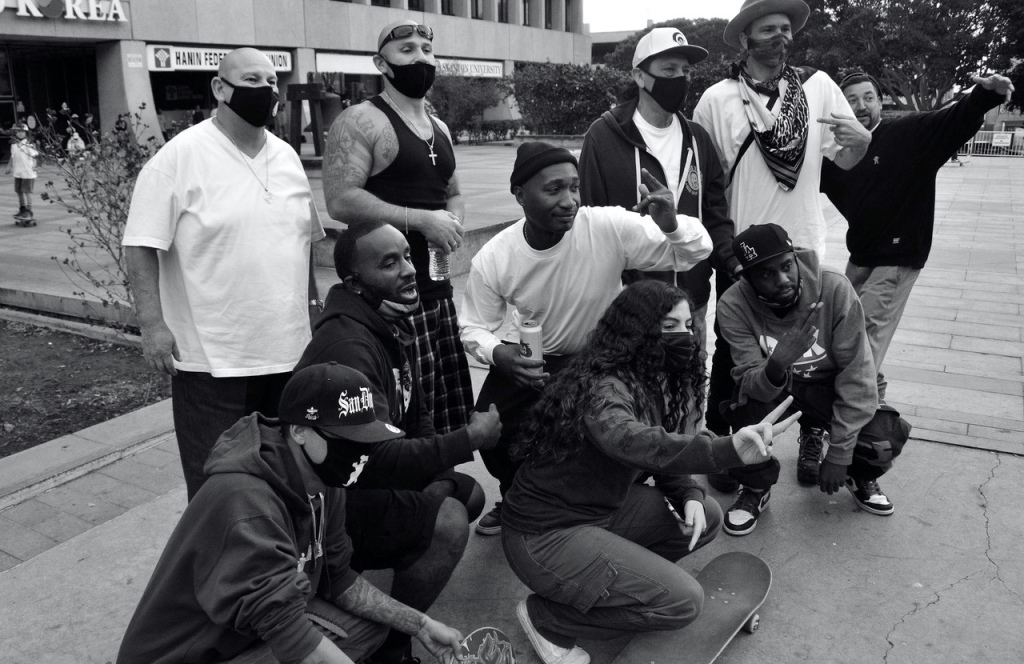
Alomar had just been released from Pelican Bay State Prison after having done four years of a nine-year stint for what he called “anger problems.”
Since, his release he has been working with the Anti Recidivism Coalition, a non-profit prison reform organization while pursuing a career as an actor and launching his LCKWD Athletics clothing company, named after another famous L.A. skate spot, Lockwood.
Raised in Echo Park, Alomar grew up skateboarding the streets of Los Angeles before getting sponsored. Together with Menace, Chocolate and Girl skate team members, other skate spots like Lockwood of Lockwood Elementary in East Hollywood, were put on the map as footage of these spots became fixtures in many skate videos of the 90s.
Alomar recalled first skating Liberty Park, then Beneficial Plaza (JKwon) with famed skateboarder, Gabriel Rodriguez, of the Pico-Union district, as far back as 1987-88. Sadly, Rodriguez passed away in 2019 at the young age of 46 leaving in his path an indelible mark on the skateboarding community at large.
“I took Danny (Machete) to JKwon,” Alomar said, “Because I wanted him to get a glimpse into my world. Since I’ve been out of prison, I’ve been in his world helping him give away toys and doing fund raisers. Doing God’s work. I just wanted to show him a little of what I’ve been doing and where I came from. After all, skateboarding saved my life.”
Trejo’s response and reaction? Well, he casually FaceTimed Mayor Eric Garcetti, Alomar said:
“He called the mayor and showed him everyone skating and told him, ‘Hey look, we’re all wearing masks here. Everybody’s cooperating. These are good kids here. Keep giving them spots to skate because they need this outlet,’” Alomar recalled during a phone interview.
For now, Jkwon, Liberty Park, is safe from any redevelopment plans. And at least on Sundays, skateboarding there continues to be hassle free. It’s common to see casual observers sit nearby to listen and watch the skateboarders:
“I actually grew up going to skate parks because my brother skateboarded. So, I would show up to skate spots like this all the time,” Kayla, 23, retired dancer, the “naughty kind” of Portland, Maine said. When asked what her thoughts were on the history of the spot and skateboarding in general, she said:
“Skateboarding is hot.”
